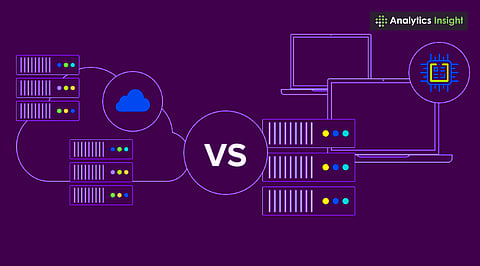

Cloud hosting offers scalability, remote access, and cost flexibility.
Local hosting ensures control, security, and faster on-premise performance.
The best choice depends on business size, budget, and growth plans.
Are you trying to choose between cloud and local hosting for your business in 2025? Reliable hosting is essential for the smooth operation of websites, applications, and data. This decision is significant, as it can impact your business’s performance. When deciding between cloud and local hosting, consider your business size and growth objectives.
Both options have advantages and limitations. The right choice can improve efficiency, reduce costs, and support long-term growth. This article compares the two and explores which option can be the better fit for your needs.
Cloud hosting is similar to storing your files across multiple external servers owned by service providers. AWS, Google Cloud, and Microsoft Azure are among the major players in this space.
Key advantages of cloud hosting:
Easy to grow without buying extra features
Accessible from any location.
You only pay for what you use.
Automatic backups in case something goes wrong.
Local hosting is when you store all your files on computers located directly in your office or data center. Companies that want close control over security prefer this option. Unlike cloud hosting, your own IT department handles these servers.
Also Read: Best Cloud Hosting Platforms for Big Data Projects
Why local hosting can be good:
Direct control over servers and security.
Faster access for employees within the office network.
Suitable for sensitive industries such as banking and finance.
Independence without reliance on third-party providers.
Many startups compare cloud vs. hosting options to find scalable and affordable solutions. At first, cloud hosting might appear cheaper because you only pay for what you use. However, if your site becomes extremely popular or you require a substantial amount of space, those costs can increase significantly.
Getting your own local hosting means spending more money upfront – you have to buy the equipment and hire someone to run it. However, after that, the monthly costs remain relatively steady. If you know what to expect, local hosting can sometimes be cheaper in the long run.
Security is a huge deal. Cloud providers now offer robust security measures and adhere to all relevant data protection rules. Still, things can happen, and you're relying on their rules.
Local hosting means your sensitive data never leaves your premises, providing a greater sense of security. However, you need to handle all the security updates and monitor everything yourself. If you're handling sensitive information, local hosting is a safer option.
The difference between cloud and local hosting lies in scalability, control, and cost efficiency. Cloud hosting is usually reliable. Since your data is on different computers, if one goes down, another takes over. This keeps your website and apps up and running. Local hosting may be faster, particularly for those in the office. However, if the server crashes, it may take longer to recover.
One of the best aspects of cloud hosting is its ease of growth. If you're a startup, selling items online, or experience seasonal spikes in demand, you can quickly get more space. Local hosting isn't as easy. You have to buy new items, which takes time and costs money. That's why many growing businesses are opting for cloud setups.
The difference between cloud and local hosting lies in scalability, control, and cost efficiency. It really depends on what you need. Cloud hosting is ideal for startups, small businesses, and companies expecting rapid growth. It's cheap, and you can work from anywhere.
However, if you want total control, especially when dealing with sensitive information such as health or banking details, then hosting it yourself is the best option. Some people even mix cloud and local hosting to get the best from each.
Also Read: Ditch the Cloud: 8 Powerful Self-Hosted Tools for Windows
Cloud and local hosting still matter to businesses. Cloud hosting is quick, scales up easily, and you can access it from anywhere. Local hosting provides you with control and enhanced security.
The best choice really depends on your specific needs, your budget, and what you plan to do later on. Figure out those things, and you’ll make the right choice to support long-term success.
